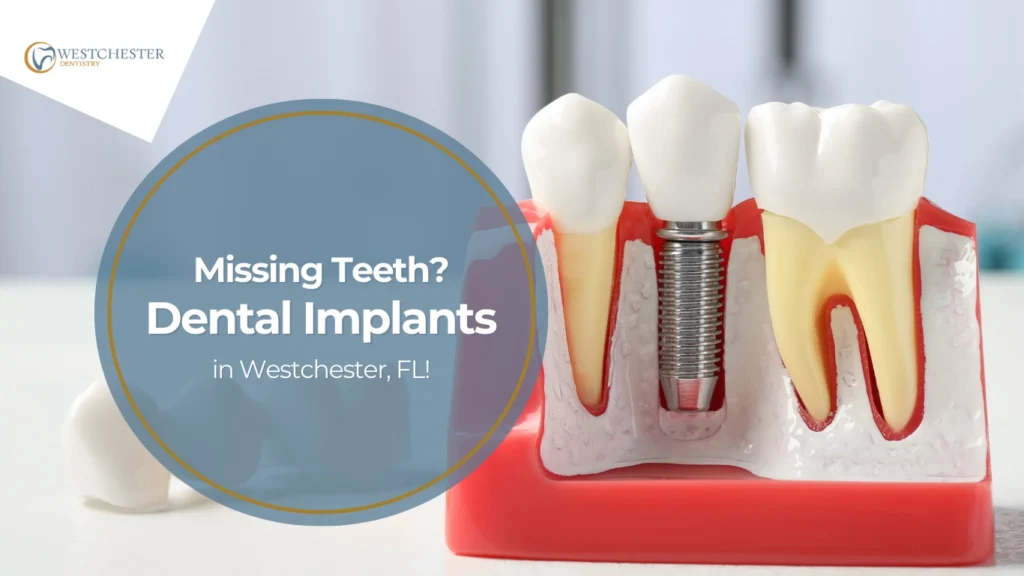
Protecting Your Dental Work: What to Avoid and What to Do with Bridges and Crowns
Getting a dental crown or dentistry bridge is an excellent way to restore your smile, protect damaged teeth, and improve functionality. However, to ensure their longevity, you must take proper care of them. Patients looking for “dental crowns near me” often ask what foods they should avoid, what to do if a crown falls out, and how to handle gum inflammation around a dental bridge or crown. In this blog, Westchester Dentistry will answer these concerns and more. If you have any issues with your dental work, call us at (305) 223-0072.
Foods to Avoid with Crowns and Bridges
Although bridges and crowns are designed to be durable, certain foods can weaken or damage them over time. Hard foods like ice, nuts, and hard candies can crack or chip the material, leading to costly repairs. Sticky foods such as caramel, chewing gum, or toffee can pull at the crown or bridge, loosening it from its position. Additionally, overly chewy foods like steak or bagels may place excessive pressure on the restoration, increasing the risk of fractures. Acidic foods and beverages, such as citrus fruits and soda, can also wear down the bonding material. To protect your investment, be mindful of your diet and opt for softer, less abrasive foods.
What Happens If My Crown Falls Out?
If your crown falls out, do not panic. First, locate the crown and rinse it with warm water. Avoid using glue or over-the-counter adhesives to reattach it yourself, as this can cause further damage. Instead, store the crown in a clean container and call Westchester Dentistry at (305) 223-0072 for an appointment as soon as possible. In the meantime, avoid chewing on the exposed tooth and use dental wax or temporary dental cement (available at pharmacies) to protect it. A missing crown exposes the tooth underneath, making it vulnerable to sensitivity, decay, and further breakage. The sooner you visit a dentist, the better your chances of saving the crown.
What to Do About Inflamed Gums Around a Crown or Bridge
If you experience gum inflammation around your dental crown or dentistry bridge, it could be due to plaque buildup, poor oral hygiene, or an ill-fitting restoration. Symptoms like redness, swelling, tenderness, and bleeding indicate irritation or infection. To reduce inflammation, practice good oral hygiene by brushing gently around the area with a soft-bristled toothbrush and using an antibacterial mouthwash. Flossing is crucial, but be careful not to pull on the bridge. If the inflammation persists, schedule an appointment at Westchester Dentistry for an evaluation.
Can a Crown or Bridge Be Repaired Instead of Replaced?
In some cases, a damaged crown or bridge can be repaired rather than replaced. If there is only a minor chip or wear, your dentist may be able to smooth the surface or add bonding material. However, if the structure is severely compromised or the fit is no longer secure, replacement is necessary. Regular dental check-ups can help detect minor issues before they become major problems.
How Long Do Dental Crowns and Bridges Last?
With proper care, dental crowns and bridges can last between 10 to 15 years or more. The longevity depends on factors such as oral hygiene, diet, and whether you grind your teeth. Avoiding harmful habits like chewing on ice, using your teeth to open packages, or neglecting dental visits can significantly extend their lifespan.
Is It Normal to Experience Sensitivity with a New Crown or Bridge?
Yes, it is common to experience some sensitivity to hot or cold foods and beverages after getting a dental crown or bridge. This sensitivity should subside within a few weeks as your tooth adjusts. If it persists or worsens, it may indicate an issue with the fit or underlying tooth health. Contact Westchester Dentistry if you experience prolonged discomfort.
How Do I Clean My Dental Bridge Properly?
Cleaning a dentistry bridge requires more effort than caring for natural teeth because plaque can accumulate underneath it. Use a bridge floss threader or an interdental brush to clean beneath the bridge and prevent gum disease. Regular brushing and rinsing with an antiseptic mouthwash will also help keep the area free of bacteria.
Can I Whiten a Crown or Bridge?
Unfortunately, whitening treatments do not work on dental crowns or bridges because they are made from porcelain or composite materials that do not respond to bleaching agents. If you are concerned about discoloration, consider replacing the restoration to match your natural tooth shade.
When Should I Replace My Crown or Bridge?
You should consider replacing your dental crown or bridge if you notice visible wear, cracks, or if it feels loose. Additionally, if you experience persistent gum inflammation or discomfort, the restoration may no longer fit properly. Regular dental visits at Westchester Dentistry will help determine when a replacement is necessary.
A well-maintained dentistry bridge or dental crown can last for years, but it requires proper care and attention. If you need expert advice or have concerns about your bridges and crowns, call Westchester Dentistry at (305) 223-0072. Our team is here to ensure your dental work remains in excellent condition for as long as possible.



